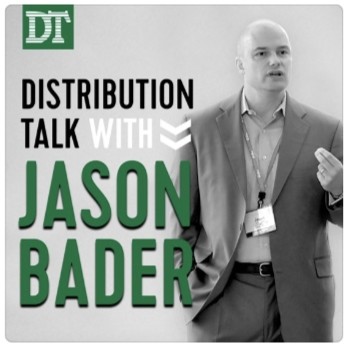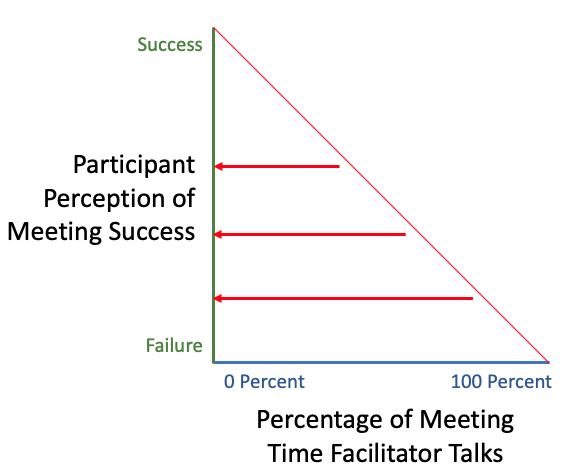Today we bring you quick tips for more effective meetings. “Distribution Talk With Jason Bader“, a podcast that exposes…
“… the stories, struggles, and solutions from interesting characters who have chosen to make a career in the distribution industry.”
~ Jason Bader
In Jason’s interview with Terrence Metz, Managing Director and Lead Facilitation Trainer for MGRUSH Facilitation and Coaching, Terrence shares some quick tips for more effective meetings . . .
“You don’t build consensus around what people think. You build consensus around why they think it.”
~ Terrence Metz
Jason is a class act and a renowned distribution expert. On behalf of his clients and listenership, he asked for some quick tips to help his clients better prepare and deliver meetings to increase their effectiveness.
Neutrality Tips for More Effective Meetings
The 30-minute conversation begins by exploring the challenges of neutrality. With experience dictating that there is more than one right answer, the scar tissue that builds up from “biting your tongue” teaches the ego to hide. We all prefer to avoid pain, and speaking causes more pain than listening. In fact, according to Terrence:
“Meetings are always more effective when the client speaks more than the consultant.”
~ Terrence Metz
Therefore, take your content knowledge and put it in the form of a question(s). Prepare the questions in advance and sequence them properly. Then you can afford to stand back and seek to understand. The neutral facilitator is most effective when, with heartfelt sincerity, they help the group seek the best answer for them. Not the universal answer or the best answer for everyone. Rather, it helps them find the best answer for them, given their situation, assumptions, and constraints. That’s what servant leaders are all about.
Define Consensus for More Effective Meetings
Consensus means everyone agrees. However, it also means that it may not be anybody’s favorite. Consensus means I might prefer something else, but the resolution is robust enough that I can support it professionally and, personally, I will not lose any sleep over it.
It also means that if you cannot support it, or if you will lose any sleep over it, we do NOT have a consensus. Therefore (if you are an employee in a for-profit organization), if you have a problem, you have a fiduciary responsibility to speak up. As well-paid professional adults, your point of view will be recognized and you will be protected from fall-out or damage, but speaking is incumbent on you. The facilitator must protect the people, but not be expected to reach down their throats to pull it out of them.
“For professionals, a meeting is not an opportunity to speak, rather it is an obligation speak.””
~ Terrence Metz
Meeting Method Based on Meeting Type
Facilitation bases its effectiveness on servant leadership skills. Core skills include speaking clearly, asking precise questions (properly sequenced), actively listening to responses, and observing reactions, all the while maintaining perfect neutrality (referees never grab the ball from the player to score). The combination of these elements implies some structure.
Structured meetings run contrary to the opposite, an unstructured discussion. People frequently have a headache when they depart from a discussion, which is not surprising. The term discussion is closely related to the terms concussion and percussion.
At the very least, a quick tip for effective meetings requires you to determine (in advance) to know what DONE looks like. Are you . . .
- Planning? (WHO does WHAT by WHEN)
- Prioritizing (purpose, options, criteria)
- Problem-solving (gap analysis or present-future comparisons)
- etc.
Eight Meeting Killers of More Effective Meetings
Jason further explores a previous article on Facilitation Best Practices, linked above, and summarized briefly here:
- Participants ought to be prepared in advance, even if a culture shift is required (starts with leadership).
- Punctuality is critical so STOP one-hour meetings and run 50-minute meetings that give participants time to transition and attend to personal requirements.
- Always start with the end in mind, the single most important contributor to an effective meeting. This describes leadership, also called, line of site. Where are we going?
- Avoid structureless meetings called discussions (see above).
- STOP using the first-person singular term “I”. This is not about you and never was. This is all about them. Are you willing to serve or do you need to be served?
- As a servant leader, shut up and listen. (see chart below)
- Use ground rules to avoid unstructured discussions. (see above)
- Avoid hybrid meetings with some virtual and some face-to-face participants. Make them all or none and treat everyone equally. If not, virtual participants frequently get treated like second-class citizens.
We’re not trying to argue that the slope above is perfectly linear. Rather, the angle makes it clear. If you want to increase the likelihood of meeting success, shift as much airtime as possible to participants. When you talk the entire meeting (that sucked). When they talk the entire meeting (that was dope).
Three Things To Do for More Effective Meetings?
When asked for a few simple things for listenership to do differently to increase their likelihood of more effective meetings, Terrence says . . .
- Get off to a smooth start. Use our seven-step Introduction sequence to ensure a solid, five-minute start to any meeting or workshop.
- No hybrids — Avoid calling on virtual participants last. At the very least, call on them first. (During Covid-19, set up a virtual seating arrangement and use a roll call method).
- For staff meetings or regularly held “information-sharing” (or updates), embrace the three-question approach:
- Tell us, WHAT have you accomplished since we last met?
- What are you working on now?
- What kind of impediments or challenges might you have that any of us can help you out with?
Use the link below to listen to Jason’s interview with Terrence, and listen directly to Jason Bader’s website.
______
Don’t ruin your career by hosting bad meetings. Sign up for a workshop or send this to someone who should. MGRUSH workshops focus on meeting design and practice. Each person practices tools, methods, and activities daily during the week. Therefore, while some call this immersion, we call it the road to building high-value facilitation skills.
Our workshops also provide a superb way to earn up to 40 SEUs from the Scrum Alliance, 40 CDUs from IIBA, 40 Continuous Learning Points (CLPs) based on Federal Acquisition Certification Continuous Professional Learning Requirements using Training and Education activities, 40 Professional Development Units (PDUs) from SAVE International, as well as 4.0 CEUs for other professions. (See workshop and Reference Manual descriptions for details.)
Want a free 10-minute break timer? Sign up for our once-monthly newsletter HERE and receive a free timer along with four other of our favorite facilitation tools.
Go to the Facilitation Training Store to access proven, in-house resources, including fully annotated agendas, break timers, and templates. Finally, take a few seconds to buy us a cup of coffee and please SHARE with others.
In conclusion, we dare you to embrace the will, wisdom, and activities that amplify a facilitative leader. #facilitationtraining #MEETING DESIGN
______
With Bookmarks no longer a feature in WordPress, we need to append the following for your benefit and reference
- 20 Prioritization Techniques = https://foldingburritos.com/product-prioritization-techniques/
- Creativity Techniques = https://www.mycoted.com/Category:Creativity_Techniques
- Facilitation Training Calendar = https://mgrush.com/public-facilitation-training-calendar/
- Liberating Structures = http://www.liberatingstructures.com/ls-menu
- Management Methods = https://www.valuebasedmanagement.net
- Newseum = https://www.freedomforum.org/todaysfrontpages/
- People Search = https://pudding.cool/2019/05/people-map/
- Project Gutenberg = http://www.gutenberg.org/wiki/Main_Page
- Scrum Events Agendas = https://mgrush.com/blog/scrum-facilitation/
- Speed test = https://www.speedtest.net/result/8715401342
- Teleconference call = https://youtu.be/DYu_bGbZiiQ
- The Size of Space = https://neal.fun/size-of-space/
- Thiagi/ 400 ready-to-use training games = http://thiagi.net/archive/www/games.html
- Visualization methods = http://www.visual-literacy.org/periodic_table/periodic_table.html#
- Walking Gorilla = https://youtu.be/vJG698U2Mvo

Terrence Metz, president of MG RUSH Facilitation Training, was just 22-years-old and working as a Sales Engineer at Honeywell when he recognized a widespread problem—most meetings were ineffective and poorly led, wasting both time and company resources. However, he also observed meetings that worked. What set them apart? A well-prepared leader who structured the session to ensure participants contributed meaningfully and achieved clear outcomes.
Throughout his career, Metz, who earned an MBA from Kellogg (Northwestern University) experienced and also trained in various facilitation techniques. In 2004, he purchased MG RUSH where he shifted his focus toward improving established meeting designs and building a curriculum that would teach others how to lead, facilitate, and structure meetings that drive results. His expertise in training world-class facilitators led to the 2020 publication of Meetings That Get Results: A Guide to Building Better Meetings, a comprehensive resource on effectively building consensus.
Grounded in the principle that “nobody is smarter than everybody,” the book details the why, what, and how of building consensus when making decisions, planning, and solving problems. Along with a Participant’s Guide and supplemental workshops, it supports learning from foundational awareness to professional certification.
Metz’s first book, Change or Die: A Business Process Improvement Manual, tackled the challenges of process optimization. His upcoming book, Catalyst: Facilitating Innovation, focuses on meetings and workshops that don’t simply end when time runs out but conclude with actionable next steps and clear assignments—ensuring progress beyond discussions and ideas.





